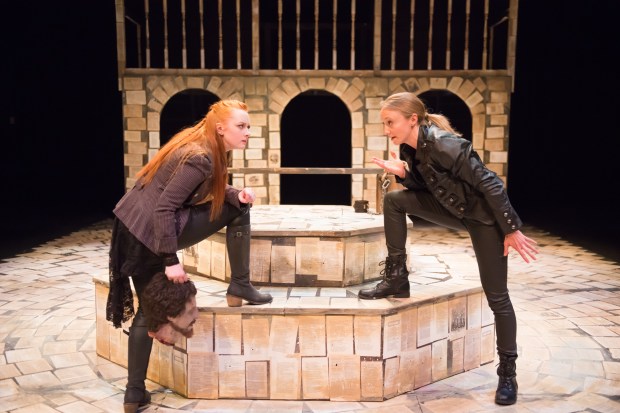
Left to Right: Allison Lynch (Desdemona) and Julie Orton (Iago) in Anne-Marie MacDonald’s Goodnight Desdemona (Good Morning Juliet), presented by The Shakespeare Company & Handsome Alice Theatre & Hit & Myth Productions. Photo Credit: Benjamin Laird Arts & Photography.
Co-presented with The Shakespeare Company and Hit & Myth Productions, Handsome Alice Theatre, formerly known as Urban Curvz Theatre, makes its debut with Anne-Marie MacDonald’s 1988 play Goodnight Desdemona (Good Morning Juliet). Winner of the Governor General’s Award for Drama, the Canadian play applies feminist theory to the works of William Shakespeare, namely Othello and Romeo & Juliet, critiquing academia and the patriarchy while doing so.
Directed by Kate Newby, Goodnight Desdemona (Good Morning Juliet) tells the story of Constance Ledbelly (Ayla Stephen), a doctoral student who believes Othello and Romeo & Juliet were originally intended as comedies. Her theory is based on the Gustav manuscript, a mysterious document that Constance has yet to decipher. Constance’s dissertation is ridiculed by Professor Claude Night (Mabelle Carvajal), whom she has a crush on. Professor Night’s news that he has accepted a position at Oxford University, the very same Constance was hoping to land, devastates the lowly academic. Heartbroken, Constance loses all hope for both her romantic and academic aspirations, deciding right there and then that she will die alone, forgotten by Professor Night.
From here, the play plunges straight down a rabbit hole, dropping Constance first into Othello then Romeo & Juliet. Our hapless heroine embarks on a quest through her subconscious to find her identity, meeting the characters of Shakespeare’s plays along the way. Constance’s presence, however, changes the plays from tragedies to comedies, fulfilling her theory, albeit with unintended results as she becomes too involved in the plots.
What stands out most in MacDonald’s subversive play is the influence of the male gaze on Shakespeare’s female characters. For one, Constance refers to characters by what male academics have written about them, which creates some dissonance when she actually meets them. And then, there’s Shakespeare himself who sees Desdemona (Allison Lynch) as a possession for Othello who has her life in his hands, not unlike Professor Night with Constance. Juliet (Geneviève Paré) is prepared to die for Romeo (Julie Orton), her self-worth tied to romantic love with a man, again not unlike Constance and her love for Professor Night.
And so, Constance’s journey of self-discovery is about reclaiming her identity from patriarchal subjugation.
MacDonald’s play is very funny, there’s no doubt about that, but it’s also very smart. The text is rich in commentary about sexuality, the glass ceiling for female academics, and male-centric interpretations of English literature, all of which the Canadian playwright delivers with a deft hand. Thankfully, the play’s quirky humour is able to breathe through all these layers. Sometimes, comedic plays with big ideas fall flat as they are neither very funny or very insightful, effectively crushed under the weight of their ambition. MacDonald’s play rises to the task of producing smart, entertaining theatre.
Under Newby’s direction, the production is wild and delightfully weird. The director has chosen to stage the play in the 1970s, the era of funk and free love. The production is certainly funky with its collection of disco tunes, like Do The Hustle (Anton de Groot, Light and Sound Designer). The era is appropriate given the gender-bending that occurs with not only the presence of an all-female cast, but also Romeo and Juliet’s cross-dressing to win Constance’s favour; liberation from the status quo.
Julie Arsenault’s set is simple, yet effective. A two-tiered structure sits in the middle with two trap doors on its top. There is a balcony at the back of the theatre. At first glance, the floor – and the balcony wall – has normal flooring tiles, but then upon closer examination the tiles are actually pages of text from Shakespeare’s plays! Arsenault’s detail really establishes the Shakespeare wonderland Constance finds herself in.
In this wacky wonderland, we have an all-star female cast firing on all cylinders. Orton is a genuine scene stealer, and that’s a tough statement given that the comedic talent here is simply astounding. Even Orton’s most miniscule physicalities as the scheming Iago are hilarious. Her knack for physical comedy is no doubt from her years of improv experience. And then there’s Stephen who plays the Constance as if she were a cat hoarder days away from appearing on some TLC reality show. It’s an understated performance that fits marvelously with the surrounding absurdity. Lynch channels her inner Xena, warrior princess, for Desdemona, and it’s fantastic. Paré plays the death-obsessed, if not suicidal, Juliet with zest – o happy dagger indeed! Carvajal plays brings plenty of meaty machismo to the male characters of Professor Night, Othello and Tybalt.
Handsome Alice Theatre’s debut production is ferociously funny. Goodnight Desdemona (Good Morning Juliet) is a near-perfect introduction to this company dedicated to unleashing the female voice.
The Shakespeare Company & Handsome Alice Theatre & Hit & Myth Productions present Goodnight Desdemona (Good Morning Juliet) by Anne-Marie MacDonald, May 12 – 21 at Vertigo Theatre’s The Studio.
For more information about the show, including how to purchase tickets, visit: http://www.shakespearecompany.com/current-season/goodnight-desdemona-good-morning-juliet/
